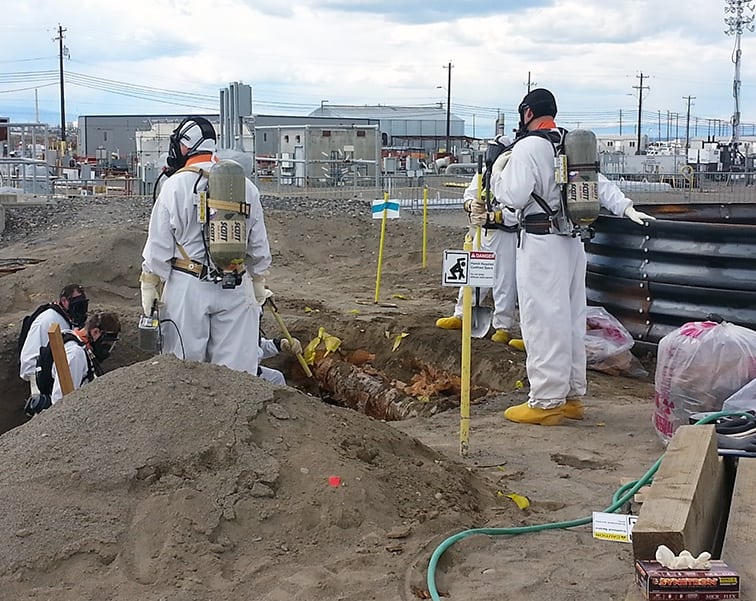
The Department of Energy could be at risk of millions of dollars of additional unnecessary costs at the Hanford Site in Washington state if it does not improve its oversight at the massive nuclear cleanup project, the agency’s inspector general said in a report this week.
The Office of Inspector General released a summary of seven years of findings about Hanford to highlight the issue. The report recapped 38 investigations and 24 audits and inspections at the former plutonium-production facility between fiscal years 2012 and 2018.
“The Hanford Site has been plagued with mismanagement, poor internal controls, and fraudulent activities, resulting in monetary impacts totaling hundreds of millions of dollars by the various contractors involved at the site,” the new report said. “As many of the weaknesses continue, without more oversight of contractors and subcontractors, millions of dollars will continue to be at risk for inappropriate charges and potential fraudulent activities.”
The Energy Department has made improvements in response to Office of Inspector General findings, but weaknesses continue with the management of contractors and subcontractors “at a level that, in our opinion, results in an unacceptable level of risk of inappropriate charges to the government,” the new report said.
In a prepared statement, Energy Secretary Rick Perry said he has sought to end the type of waste, fraud, and abuse detailed in the compilation report.
“The reports have historically provided the Department with valuable recommendations, over 85 percent of which have been implemented and will serve as an important tool as we continue to aggressively address the challenges related to Hanford and our sites across the DOE complex,” Perry said.
The agency has suggested the inspector general prepare similar reports looking at historical activities at other facilities to aid its ongoing environmental remediation of the nuclear complex, according to a DOE statement. Such reports help to guide DOE efforts and to hold contractors and subcontractors accountable, it said.
Of the audits covered by the report, seven were issued during the current administration and all but two had issues addressed and closed.
The Energy Department has taken action based on the reports, including withholding fees to hold its contractors accountable. Oversight has been increased through means such as tapping industry experts to conduct independent assessments. The department also has required contractors to establish mitigation plans for prohibited activities.
Because of findings that some Hanford workers have feared retaliation if they raised concerns, more safety culture training has been developed for senior, middle and front-line leaders. A DOE-wide Safety Culture Improvement Panel was established made up of leadership from all departmental elements.
Among the many past findings recapped in the new report:
- In November 2016, the Department of Justice announced that Bechtel and URS (now owned by AECOM) agreed to pay $125 million to resolve allegations that the companies had charged DOE for materials and services at the Hanford Waste Treatment Plant that did not meet stringent nuclear quality standards. The settlement also covered allegations that Bechtel used federal contract funds to lobby Congress for continued funding of the vitrification plant. Both companies denied any wrongdoing.
- The Energy Department in 2016 accused Hanford support services provider Mission Support Alliance of improperly awarding $63.5 million in taxpayer money as profit to a Lockheed Martin subcontractor with which it then shared ownership ties. The department told auditors it had made clear from the start of the Lockheed Martin Services subcontract that the award was classified to prevent separate profit payments to the subcontractor in addition to profit payments to Mission Support Alliance. Mission Support Alliance disputed that the subcontractor profit payment was prohibited.
- The Energy Department could have saved $6.2 million annually by moving cesium and strontium from underwater storage in central Hanford to safer and less expensive dry storage sooner, according to a 2014 Office of Inspector General report. The agency is preparing to move the capsules now.
- CH2M Hill Hanford Group, the Hanford waste tank farm contractor from 1999 to 2008, agreed to pay $18.5 million in 2013 to settle Department of Justice allegations of time-card fraud. It was accused of billing the federal government for overtime hours that employees had not worked. The Justice Department said Hanford workers were offered overtime shifts with pay for a full eight hours but routinely allowed to leave if work was completed sooner. The pay was not adjusted to reflect the shortened shift. Current tank farm contractor Washington River Protection Solutions paid $5.275 million to settle similar allegations in January 2017. Both contractors denied wrongdoing.